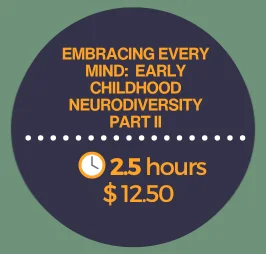
Embracing Every Mind: Early Childhood Neurodiversity Part II
If you are employed in a state that uses a registry to track professional development hours, you will be able to provide your registry ID (Stars, MOPID, Registry or other ECE ID#) after you have completed the quiz for the course. If you pass the quiz we will report your course completion to the state registry using the registry ID that you provide.
This course provides early childhood educators with a foundational understanding of neurodiversity, an approach that views neurological differences as natural human variations rather than deficits. We will explore common neurodevelopmental profiles often encountered in early childhood settings. The course emphasizes embracing each child’s unique strengths and challenges. Course length – 2.5 hours.
The course helps answer the following questions:
-
What is OCD?
-
What is Bipolar?
-
What is Prader-Willi Syndrome?
-
What is Irlen-Syndrome?
Participants who successfully complete this course will be able to:
-
Be able to articulate the core concept of neurodiversity.
-
Recognize the diverse strengths and needs of neurodivergent children.
-
Foster a strengths-based approach to neurodiversity.
-
Be able to identify characteristics and early identifiers of common neurodevelopmental conditions.
-
Be able to define neurodiversity and its significance in early childhood development.